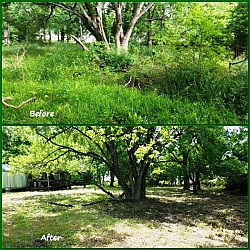Best DIY, Earth-friendly Glass Cleaners
 I don't do windows. Unfortunately, neither does my wife. So we have ample opportunity to test any number of homemade glass cleaners (and you're welcome to come over and try some, anytime). But since I really don't do window cleaning, I conducted this test on an even more rigorous proving ground: the family bathroom mirror. Ours happens to cover 25 square feet and is illuminated like a vanity in a Broadway dressing room. If a glass cleaner can make it here, it can make it anywhere.
I don't do windows. Unfortunately, neither does my wife. So we have ample opportunity to test any number of homemade glass cleaners (and you're welcome to come over and try some, anytime). But since I really don't do window cleaning, I conducted this test on an even more rigorous proving ground: the family bathroom mirror. Ours happens to cover 25 square feet and is illuminated like a vanity in a Broadway dressing room. If a glass cleaner can make it here, it can make it anywhere.
Presenting ... our best DIY glass cleaner test results!
Solution #1
Recipe:
1 part white vinegar
10 parts warm water
Application:
Mix solution in a pan, bucket, or spray bottle. Clean the glass with a cloth dipped in the solution or apply it with a spray bottle, then wipe dry with newspaper.
Notes:
Water and white vinegar is a traditional home recipe, but this specific ratio and cloth application comes from the Farmer's Almanac. On glass (as with another test I did on floors), it's hard to detect a clear benefit from the vinegar, as opposed to plain water. This solution goes on very wet, which means lots of wiping to finish the job and prevent streaks and spots. The cloth method seems to speed up the application and help with gunk and oily spots, but the vinegar doesn't add much cleaning power, if any.
Solution #2
Recipe:
1 cup rubbing alcohol
1 cup water
1 tablespoon white vinegar
Application:
Mix solution in a spray bottle. Spray glass surface and wipe with newspaper, as with standard window cleaner.
Notes:
This solution, also from the Farmer's Almanac, is a fast-drying version of the classic vinegar-and-water formula and is described as "a good rival for commercial glass cleaners." I absolutely agree. It's much less watery than the other homemade test formulas, and it wipes dry with only a bit more effort than that required with Windex. It also cuts through smudges and smears like commercial cleaners. The hands-down winner in this test. The strong alcohol smell is a little redolent of a nurse's office (or a frat party), but it goes away when dry.
Solution #3
Recipe:
Hot water
Few drops dishwashing liquid
Application:
Mix solution in spray bottle. Spray glass and squeegee or wipe dry with newspaper.
Notes:
Martha Stewart's website recommends wiping this solution from the glass with a high quality squeegee and also suggests using less soap if you get streaks. I didn't get streaks with my first batch, so this shouldn't pose much of a problem. This formula worked surprisingly well given its simple ingredients. Watery, for sure, but a better cleaner than the vinegar and water, if not as good as Solution #2.
Solution #4
Recipe:
Club soda
1 teaspoon lemon juice (optional)
Application:
Pour a small amount of club soda into a spray bottle. If desired, add lemon juice as a degreaser. Spray onto glass and wipe with a terry cloth cotton rag.
Notes:
Plain club soda is commonly recommended as a glass cleaner, but the tips of adding lemon juice and using a terry cloth rag come from Green America. I had relatively poor results with this mixture. The effervescent club soda seemed lighter and less watery than Solution #1, but its cleaning power was no better. It was also more likely to streak, requiring extra wiping. And the lemon doesn't add any springy citrus freshness, in case you're wondering. However, this solution does offer one advantage over all the others: When you're done with the windows, you can pour the remaining solution over ice, add gin and sugar, and you've got yourself a recycled Tom Collins. Now that's thinking green!
Updated November 25, 2018.
Looking for a Pro? Call us (866) 441-6648

Cleaning Average Costs
Cleaning Services Experiences

The Right Landscaper Can Change A Yard From Terrible To Terrific

Don’t Be A Goober – Hire Qualified Pros For Safe Tree Removal



